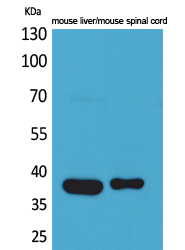
| WB | 咨询技术 | Human,Mouse,Rat |
| IF | 咨询技术 | Human,Mouse,Rat |
| IHC | 咨询技术 | Human,Mouse,Rat |
| ICC | 技术咨询 | Human,Mouse,Rat |
| FCM | 咨询技术 | Human,Mouse,Rat |
| Elisa | 1/20000 | Human,Mouse,Rat |
| Aliases | ALDOC; ALDC; Fructose-bisphosphate aldolase C; Brain-type aldolase |
| Entrez GeneID | 230; |
| WB Predicted band size | 39kDa |
| Host/Isotype | Rabbit IgG |
| Antibody Type | Primary antibody |
| Storage | Store at 4°C short term. Aliquot and store at -20°C long term. Avoid freeze/thaw cycles. |
| Species Reactivity | Human,Mouse,Rat |
| Immunogen | Synthesized peptide derived from the N-terminal region of human Aldolase C. |
| Formulation | Purified antibody in PBS with 0.05% sodium azide,0.5%BSA and 50% glycerol. |
+ +
1. **"Aldolase C is a specific marker for Purkinje cells in the cerebellum"**
*Author: F. Fonnum et al. (1981)*
摘要:该研究首次报道了Aldolase C抗体在小脑浦肯野细胞中的特异性标记作用,通过免疫组化证实其作为该神经元亚型的高选择性探针。
2. **"Antibodies against aldolase C in the study of neurodegenerative disorders"**
*Author: M. Hiraiwa et al. (1997)*
摘要:探讨Aldolase C抗体在阿尔茨海默病模型中的应用,发现其在海马区神经元损伤评估中的潜在诊断价值。
3. **"Aldolase C as a glioma-associated antigen: Immunohistochemical analysis with a monoclonal antibody"**
*Author: T. Kato et al. (1990)*
摘要:开发针对Aldolase C的单克隆抗体,证明其在神经胶质瘤组织中高表达,提示其作为肿瘤生物标志物的可能性。
4. **"Developmental expression of aldolase C in the rat brain"**
*Author: S. Aiso et al. (1989)*
摘要:利用Aldolase C抗体分析大鼠脑发育过程,揭示其表达模式与神经元成熟及小脑皮层分层形成的相关性。
Aldolase C, also known as brain-type aldolase (ALDOC), is a glycolytic enzyme encoded by the *ALDOC* gene in humans. It belongs to the aldolase family of lyases, which catalyze the reversible cleavage of fructose-1.6-bisphosphate into triose phosphates during glycolysis. Unlike its isoforms Aldolase A (muscle-enriched) and Aldolase B (liver-specific), Aldolase C is predominantly expressed in the brain, particularly in cerebellar Purkinje cells, hippocampal neurons, and retinal cells, where it supports energy metabolism in high-energy-demanding neural tissues.
Antibodies targeting Aldolase C are valuable tools in neuroscience research, enabling the identification and study of neuronal populations, especially in cerebellar circuits. These antibodies are widely used in techniques like immunohistochemistry, Western blotting, and immunofluorescence to visualize Aldolase C expression patterns, aiding investigations into neurodegenerative diseases (e.g., ataxia, cerebellar degeneration) and neurodevelopmental disorders. Additionally, Aldolase C antibodies have been employed to explore metabolic adaptations in brain tumors, such as gliomas, where glycolytic activity is often dysregulated.
The specificity of Aldolase C antibodies makes them critical for distinguishing neural cell types and assessing metabolic changes in pathological conditions. However, cross-reactivity with other aldolase isoforms can occur, necessitating validation in specific experimental models. Overall, Aldolase C antibodies serve as essential reagents for understanding brain metabolism, neuronal function, and disease mechanisms.
×